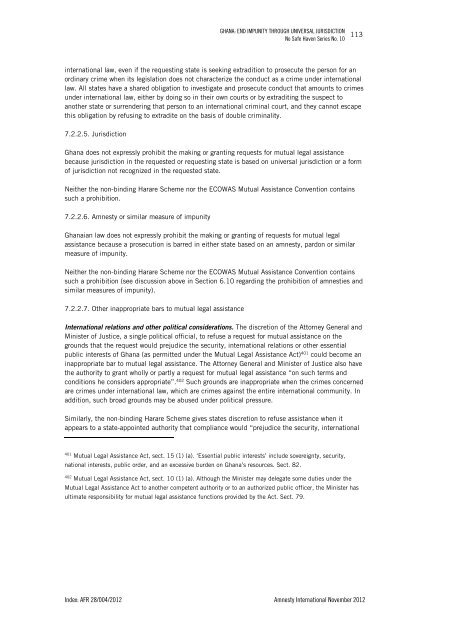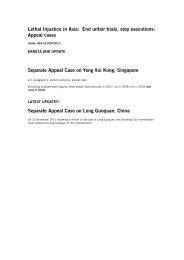Ghana - Amnesty International
Ghana - Amnesty International
Ghana - Amnesty International
You also want an ePaper? Increase the reach of your titles
YUMPU automatically turns print PDFs into web optimized ePapers that Google loves.
GHANA: END IMPUNITY THROUGH UNIVERSAL JURISDICTIONNo Safe Haven Series No. 10113international law, even if the requesting state is seeking extradition to prosecute the person for anordinary crime when its legislation does not characterize the conduct as a crime under internationallaw. All states have a shared obligation to investigate and prosecute conduct that amounts to crimesunder international law, either by doing so in their own courts or by extraditing the suspect toanother state or surrendering that person to an international criminal court, and they cannot escapethis obligation by refusing to extradite on the basis of double criminality.7.2.2.5. Jurisdiction<strong>Ghana</strong> does not expressly prohibit the making or granting requests for mutual legal assistancebecause jurisdiction in the requested or requesting state is based on universal jurisdiction or a formof jurisdiction not recognized in the requested state.Neither the non-binding Harare Scheme nor the ECOWAS Mutual Assistance Convention containssuch a prohibition.7.2.2.6. <strong>Amnesty</strong> or similar measure of impunity<strong>Ghana</strong>ian law does not expressly prohibit the making or granting of requests for mutual legalassistance because a prosecution is barred in either state based on an amnesty, pardon or similarmeasure of impunity.Neither the non-binding Harare Scheme nor the ECOWAS Mutual Assistance Convention containssuch a prohibition (see discussion above in Section 6.10 regarding the prohibition of amnesties andsimilar measures of impunity).7.2.2.7. Other inappropriate bars to mutual legal assistance<strong>International</strong> relations and other political considerations. The discretion of the Attorney General andMinister of Justice, a single political official, to refuse a request for mutual assistance on thegrounds that the request would prejudice the security, international relations or other essentialpublic interests of <strong>Ghana</strong> (as permitted under the Mutual Legal Assistance Act) 401 could become aninappropriate bar to mutual legal assistance. The Attorney General and Minister of Justice also havethe authority to grant wholly or partly a request for mutual legal assistance “on such terms andconditions he considers appropriate”. 402 Such grounds are inappropriate when the crimes concernedare crimes under international law, which are crimes against the entire international community. Inaddition, such broad grounds may be abused under political pressure.Similarly, the non-binding Harare Scheme gives states discretion to refuse assistance when itappears to a state-appointed authority that compliance would “prejudice the security, international401Mutual Legal Assistance Act, sect. 15 (1) (a). ‘Essential public interests’ include sovereignty, security,national interests, public order, and an excessive burden on <strong>Ghana</strong>’s resources. Sect. 82.402Mutual Legal Assistance Act, sect. 10 (1) (a). Although the Minister may delegate some duties under theMutual Legal Assistance Act to another competent authority or to an authorized public officer, the Minister hasultimate responsibility for mutual legal assistance functions provided by the Act. Sect. 79.Index: AFR 28/004/2012 <strong>Amnesty</strong> <strong>International</strong> November 2012
















